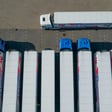Become a Creator today!Start creating today - Share your story with the world!
Start for free
00:00:00
00:00:01

Jason - HotShot Trucking/Logistics Company
There is a lot that goes into moving goods and equipment around our country. None of that happens without truck drivers, from hot shot rigs to full sized semi-trucks. We sometimes forget that the stuff on the shelves or the stuff we order doesn't deliver itself. There are people, trucks and companies that make all that happen. If you have any interest in being a part of the backbone of our economy, this interview with Jason is loaded with details to help you decide if this may be the career for you. The next time you see a truck driver, say thanks; They deserve it.
Jason can be found on his youtube channel HERE
If you found this video helpful and want to support the show, you can do so HERE. Thanks!
Transcript
Introduction and Early Life
00:00:02
The Jobs Podcast
Hey folks, you are listening to the jobs podcast. I'm your host, Tim Hendricks. Your time is valuable. I'm not going to waste it. So let's get right to the interview. Today we have Jason with us. He is a hotshot trucker and an expert on all things logistics and trucking and all that kind of stuff. So Jason, welcome to the show.
00:00:19
Jason Love
ah Thank you for having me. I'm grateful for being here.
00:00:22
The Jobs Podcast
Yeah. So let's start off like we always do. Give us a little bit of history on Jason, where you were born, your upbringing, and and we'll start into your education.
00:00:29
Jason Love
Yeah, so I actually, ah I was born in a small town called Iola, Kansas out there. And ah I guess it would be considered southwestern Kansas. No, out eastern Kansas, southwestern Missouri is where I moved to.
00:00:40
The Jobs Podcast
and Okay. Hmm.
00:00:43
Jason Love
So southeastern Kansas is where I grew up. I was born and i was born in a What I would consider or what I considered back then was a ah normal family. um You know, later on, I started to realize that, you know, we there's definitely some issues there. My father, he struggled pretty hard with drug issues.
00:01:02
The Jobs Podcast
yeah
00:01:02
Jason Love
And my mom, me and my sister, my mom left my father when we were about 12. And we ended up moving. She was remarried. And we moved to Joplin, Missouri, if anybody knows where that's at. Good old Joplin.
00:01:16
The Jobs Podcast
yeah
00:01:16
Jason Love
Um, and yeah, my, my stepfather, he was definitely, uh, he was better. we grew up pretty poor when I was living with my father, right He was a plumber, had his own business, but you know, with his, his struggles and stuff, you know, we didn't, we really have much.
00:01:30
Jason Love
Um, but My stepfather, he was a little bit better well off, so we lived you know more of a middle class life during that time, but he he struggled with alcoholism. and Once I started getting more to my teen years, we started having more of
New Beginnings in Alaska
00:01:45
Jason Love
issues. right so um I actually ended up moving to Fairbanks, Alaska when I was about 16.
00:01:51
The Jobs Podcast
Wow.
00:01:52
Jason Love
Lived with my uncle, my grandparents. My grandpa was in the military. He got stationed up in Alaska, retired there, and never left. and so I ended up moving to Alaska, finished high school up there, and then, yeah, went off to college.
00:02:05
Jason Love
but Yeah, it was definitely um definitely different, you know.
00:02:06
The Jobs Podcast
Man, that was a big jump moving from Missouri to Alaska.
00:02:12
Jason Love
i I really enjoyed kind of opportunity as a kid. That was what ah really pushed me, um whether that was with sports or with just having different opportunity, be able to do different things.
00:02:24
Jason Love
I always had some sort of a hobby, you know, and I was kind of jumping from hobby to hobby. Um, as I learned more, you know, I grew up, I'm 28 right now. So, you know, when I was about 12, I believe, or maybe a little bit younger is when YouTube was first really taken off.
00:02:33
The Jobs Podcast
Mm-hmm. Sure.
00:02:38
Jason Love
And then, you know, after that, we, uh, you know, just watching lots of YouTube videos, learning a lot of different things.
00:02:39
The Jobs Podcast
yeah
00:02:45
Jason Love
And then, uh, So when I went when the opportunity came to go to Alaska, I was starting to have issues with my with my stepfather, you know, as I was growing up. um Then I was like, let's do it. You know, I'd love to go to Alaska and live with my uncle. And, you know, it was a it was a great time, but ah ah definitely a big change.
00:03:01
Jason Love
But, you know, it was a good time, though, for sure.
00:03:02
The Jobs Podcast
sure
00:03:04
The Jobs Podcast
So you graduated from high school up in Alaska and then what?
College and Missionary Work
00:03:08
Jason Love
So after high school, I ended up going to Southern Utah. I went to college for – I only went to college for one year. I actually went down there and I wrestled. They had a wrestling team.
00:03:19
Jason Love
I wrestled through high school and went down to college for one year. And then – Well, down there in southern Utah, I actually became Mormon and I went and served a two year mission in Mexico about a year after I joined the church.
00:03:33
The Jobs Podcast
Oh.
00:03:35
Jason Love
I did one year in college and then I went to Mexico for two years as a missionary. Um, so that, that was kind of, you know, from 18 to 21. and this would have been, and think I left, I left in 2017, came back in 2019.
00:03:50
Jason Love
I was 19 years old when I left and went to Mexico. I was 21 when I came back. And after that, I moved back to Missouri. I lived at my, with my sister back in Joplin.
00:04:01
Jason Love
So that's kind of what those three years looked like.
Career Exploration and Trucking
00:04:04
The Jobs Podcast
Boy, you were you were a busy young man.
00:04:07
Jason Love
i mean Yeah, I mean, a lot of it was just opportunity, right? Like, you know, when I went to college, for example, I, you know, you go to, you're kind of in high school, and everyone's pushing you to go to college, right?
00:04:09
The Jobs Podcast
Sure.
00:04:16
Jason Love
And that's what you think is the right thing to do. And I think it is the right thing to do for a lot of people. But you almost get overwhelmed trying to pick what you want to do, you know? It's like, what I'm studying is the most important thing in the world, and if I'm going to spend this time studying it, then i you know, that's what going to do for the rest of my life.
00:04:26
The Jobs Podcast
Yeah.
00:04:35
Jason Love
And I was always about business. I, you know, kind of growing up with my father, he had his own business, but... mean, I never really saw anything. I just knew that he was a plumber and he had his own company.
00:04:46
Jason Love
But I was I really wanted to to own my own business and I wanted to learn about business. I wanted to be a part of business, you know. And so I um that's why I went and studied.
00:04:58
Jason Love
But about a year into college, I realized, you know, just the the ample amount of information that I could receive outside of college. And I wasn't that good of a student. You know, it was hard for me to – I didn't want to take a class that I didn't want to take, basically, right?
00:05:11
Jason Love
I didn't see the value so much in getting a diploma.
00:05:11
The Jobs Podcast
Yeah. Mm-hmm.
00:05:15
Jason Love
And now looking back, you know, i think a little bit different about it, you know, getting a degree. I think there's a lot of value, especially when you're that young, just to go through college and not like not staple yourself anywhere, but just, you know, finish, you know, and get that education and get that ah those opportunities that will provide you.
00:05:33
Jason Love
But back then I was kind of like, I'm to start my own business. Like, I don't really need to do this anymore. And then the opportunity came to go on a mission. And so I ended up taking that. Right.
00:05:43
The Jobs Podcast
Yeah, you were wanting to get to the meat of the issue as far as business and not waste time with, you know, art classes and all that kind of stuff that really didn't seem important.
00:05:52
Jason Love
Yeah, it was like, you know, math class. I mean, it was just all sorts of stuff. It's like, you know, I, I um wouldn't call myself a rebel, but I was just kind of cynical sometimes when it came to some of the professors and some of the classes. I was just like, why am I even here right now?
00:06:09
Jason Love
Like I went through high school, like high school is one thing, right?
00:06:10
The Jobs Podcast
Yeah.
00:06:11
Jason Love
Like you finish high school, you know, you take the classes you need to take.
00:06:13
The Jobs Podcast
Mm-hmm.
00:06:15
Jason Love
It's like right now, you know, my parents aren't forcing me to go to college. Like they're not, you know, no one's forcing me to be here right now. I don't want to be here right now. These classes, I don't feel, see any value. And that was more just being, you know, 19 years old, right.
00:06:28
Jason Love
18 years old, you know, that's just how that is.
00:06:28
The Jobs Podcast
Yeah. And you got to pay for college too.
00:06:31
Jason Love
uh, Yeah, you know, you're in college and it's like, I don't like ah some of these classes I really do enjoy. Like I was in the radio, i was part of the the radio in college and I really enjoyed that.
00:06:41
Jason Love
And some of the business classes I really enjoyed and more of my communication classes, my debate classes. Like I enjoyed those, but it was like, can I not just take these classes and gain this knowledge and not have to waste my time doing this other stuff?
00:06:41
The Jobs Podcast
Yeah.
00:06:52
The Jobs Podcast
Yeah.
00:06:54
Jason Love
And I mean, obviously it doesn't really work out like that.
00:06:58
The Jobs Podcast
Well, yeah, college is a good fit for some folks, but not for everybody. I'm i'm quickly learning with this podcast, but where did the the hotshot trucking and the logistics sort of creep into your life?
00:07:09
Jason Love
Yeah, I'll run you through it. So basically after I got off the mission, I moved to Missouri and I got a job selling cars and I i'm was 21 and i made I made good money selling cars. But I've always, you know, I have always been more of a...
00:07:25
Jason Love
wanting to but provide people with information, right? I think that's always been, you know, helping people learn something. I've always wanted to learn things and I want to help people learn things. Right. And I think, you know, one reason that people can't, uh, people don't progress is because they don't have the information necessary.
00:07:41
Jason Love
And we're so blessed, um, in today's, uh, today's world to have, so much information, you know, at our fingertips, but sometimes that makes us even lazier, right?
00:07:50
The Jobs Podcast
Yeah.
00:07:52
Jason Love
It's too easy.
00:07:52
The Jobs Podcast
Yeah. Yeah.
00:07:53
Jason Love
And people take advantage of that and they scan people. But anyways, so when I was selling cars, you know, i really enjoyed helping, you know, first time car buyers, you know younger kids that were my age and say, hey, you know this is what this is what your payment looks like. This is a car. This is how an APR works. This is how like your payments are. This is what you should do, you know refinance, get a better deal, you know this, that, and the other.
00:08:13
Jason Love
um But sometimes I was put into situations where um I felt like it was a moral issue with me, where I had to be almost dishonest.
00:08:24
The Jobs Podcast
yeah
00:08:24
Jason Love
And so i I, am ah you know, I stopped selling cars, but I was making good money for my age. And then over the summers, I would go back up to Alaska because a good friend of mine had a ah pest control business.
00:08:38
Jason Love
um and They would spray for mosquitoes. And so I would go and we would we would go door to door. We would you know, I would run a team of guys and we'd spray, you know, and it was a great time being up there in Alaska over the summer. it's beautiful and working and making good money.
00:08:52
Jason Love
After the last year that I did that, this probably would have been I probably would have been 2020. The summer of 2020 was the last year I did that. I was about to say 2023 and I'm like, we're in 2025.
00:09:04
Jason Love
This is a while ago.
00:09:05
The Jobs Podcast
yeah
00:09:05
Jason Love
Doesn't seem like a while ago, but 2020 last summer I did that.
00:09:07
The Jobs Podcast
Yeah.
00:09:09
Jason Love
um The guy who owned that company, and one of my best friends, um he's like, we should start a we should start a company. We should do something. And I remember going back to Missouri and being in church one day and talking to a friend of mine because I would i would recruit people to go to Alaska, you know whether they were technicians, you know say, hey come live in Alaska or salesmen.
00:09:30
Jason Love
And I said, let's you know what are you doing this summer? You should come to Alaska. It'll work. He's like, well, I actually you know bought a semi truck and I have a semi truck on the road. And I was like, no, you don't. And he's like, yeah, I do.
00:09:41
Jason Love
And so i was like, well, I asked him all these questions about it. I was much money are you making a week, you know, with your one truck? And he says, well, clear about a thousand bucks, you know, profit. And I said, we can do this.
00:09:53
Jason Love
And so then I called my friend, like literally 30 minutes later. And I said, hey, man, let's let's look at, you know, getting a semi truck in the trucking company, getting trucks on the road. And so that kind of started, you know, from from the first step to to where we are now.
Learning and Entering the Trucking Industry
00:10:09
Jason Love
um But once we kind of dug into it and we learned everything off YouTube, you know, like I learned all the information off YouTube. i found a couple of guys that had obviously been in it and had more information than me. And what had happened was, you know, and I had sold cars. So I understood, you know, what it took, what what it took to buy a car. You know, i was like, we both got good credit scores. We have a good down payment. We should be able to buy a semi truck.
00:10:30
Jason Love
But we learned quickly that, you know, if you don't have a CDL and you don't already have a company, you know, the banks aren't going to loan you money on a semi truck. Right.
00:10:37
The Jobs Podcast
Yeah.
00:10:38
Jason Love
And so ah we kind of were like the wind was taken out of our sale, you know, at that point, which this happens a lot in business. Anybody who's listening, this happens all the time. Your wind is going to be taken out of your sales multiple times during the course of whatever business you're running.
00:10:51
Jason Love
ah So we kind of put it on a back burner. And then i saw a video about hotshot trucking. And i was like, anybody can buy an F-350, right? As long as you you can go to a Ford dealership, you know, finance an F-350 fairly easy compared to buying a semi truck.
00:11:10
Jason Love
So then we started digging into hotshot trucking really hard, ended up buying a truck, a trailer. We activated our trucking authority. And I started making videos on YouTube about it, which is where I started my YouTube channel.
00:11:23
Jason Love
And this was, this would have been October of 2020, right? When we first, first started.
00:11:29
The Jobs Podcast
What does, i don't even know what a semi truck goes for nowadays. I mean, I'm sure you can buy used, but if you're buying new, what, what are we talking about ballpark to get your foot in the door?
00:11:38
Jason Love
Oh, yeah. If you're buying a brand new semi truck, you're talking probably one hundred and seventy thousand for.
00:11:43
The Jobs Podcast
Shoot.
00:11:44
Jason Love
And that's more for a fleet version. Right. Like so they have different semi trucks for different things. Right. So a lot of guys who are owner operators, they want more of a more powerful truck, a more owner operator friendly truck, you know, a nicer looking truck.
00:11:48
The Jobs Podcast
Mm-hmm.
00:11:56
Jason Love
ah But if you're running a company like one of these major trucking companies like Prime or J.B. Hunt or and insert name here, they're to have the fleet versions of trucks, which are basically your your automatic basic bone trucks that are 450 horsepower.
00:12:12
Jason Love
And they're hard to break, right? So you can put a driver in there. They have a lot of safety systems on them.
00:12:17
The Jobs Podcast
okay
00:12:17
Jason Love
you know And that's what you'd get brand new for like $170,000. But there i mean there are beautiful semi-trucks that go for $230,000, $240,000. But the thing is with a semi-truck is – which we don't have to get too deep into it, but they – They're hard to resell, number one, unless it's like a truck that somebody wants.
00:12:36
Jason Love
you know So if it's like one of those owner-operator trucks, you know you can get your money back out of it because people want that. But they decrease in value very quick because they're so expensive to fix, right?
00:12:46
The Jobs Podcast
Okay. Right.
00:12:47
Jason Love
And so you know you can have semi-truck. You can buy a used semi-truck that has 350,000, 400,000 miles on it, you know anywhere from 40,000 or 50,000. And you might say, oh, that's a ton of miles.
00:12:58
Jason Love
But these trucks are built to go a million miles, right?
00:13:00
The Jobs Podcast
right
00:13:01
Jason Love
Obviously, there's lots of repairs that go into them during that time. But, you know, semi truck with 500,000 miles still has a good amount of life left on it. Right. um But, you know, once a truck, especially if you buy a truck, that's not that you know sought after. Right. People don't like the engine that's in it. They don't like the transmission. They don't like the maker, whatever the case may be.
00:13:20
Jason Love
Once it gets to about 600, 700,000 miles, lot of times they just turn into they become worthless um because people. don't want to buy it, number one, or they know that there's about to be a ah big repair that's going to need to be done on it.
00:13:38
Jason Love
And they know that they won't be able to get their money back out of the truck if they repair it. um Now, all of that being said, there are a lot of trucks out there that are that are very sought after.
00:13:50
Jason Love
There's motors that are very sought after. And people will buy the truck, rebuild the motor, and they'll be able to get all the money back out of it because people want that, right? um So there's all sorts of flavors of semi trucks out there.
00:14:03
The Jobs Podcast
is it Is it a lot like the Ford Chevy Dodge debate where everybody kind of has their favorite and they think that's the best?
00:14:03
Jason Love
and
00:14:09
Jason Love
Definitely. That definitely plays a part. um
00:14:11
The Jobs Podcast
Okay.
00:14:11
Jason Love
And a lot of it is actual performance too, because you'll have, and this is kind of what makes a difference, right? For example, here, you'll have like an international semi truck, right?
00:14:23
Jason Love
International. yeah In that semi truck, you have the international motor. Now, international um does not have the best track record and the parts are very expensive.
00:14:35
Jason Love
And the dealership rates to fix anything are very expensive, right? that all goes into play, right? So like you might have a ah manufacturer who is just like trying to really take advantage of the ah customer by making all of their parts exclusive.
00:14:50
Jason Love
It's like John Deere, for example. Like John Deere is the only person allowed to fix John Deere, right?
00:14:52
The Jobs Podcast
Ah, yeah. Right, right.
00:14:55
Jason Love
That might turn you away from it, you know?
00:14:57
The Jobs Podcast
Mm-hmm.
00:14:57
Jason Love
So international, for example, their their parts are going to be very exclusive and they're going to be expensive. Now, on the other hand, you know, if you buy, you might buy an international truck that has a Cummings engine in it, right? Or somebody engine swapped it.
00:15:10
Jason Love
That truck is going to be more desirable because of that engine, right? And the Cummings are more, you know, you could find parts a lot more, lot more accessibility of parts. They're a lot more cost effective. And so when you're buying a semi truck, you have to take all of that into consideration.
00:15:25
Jason Love
Right. And it's like this truck might be cheap and it might have lower miles. But why is that? Well, the reason is because that that when that like, for example, I have an International Pro Star and it's at 750,000 miles.
00:15:38
Jason Love
I could put all the money into rebuilding that that engine and get more life out of it. But as that truck sits, it's worth 15 grand. If I rebuilt the engine for thirty thousand dollars, it'd probably be worth ah twenty two thousand dollars.
00:15:52
The Jobs Podcast
Oh my goodness. So not worth it at all.
00:15:53
Jason Love
So it's just not worth right?
00:15:54
The Jobs Podcast
Yeah.
00:15:54
Jason Love
Because nobody nobody wants it, you know?
00:15:56
The Jobs Podcast
hmm.
00:15:57
Jason Love
But there are other trucks, like I said, that it is worth it. And you'll see trucks from the late 90s that have a motor in them that have been rebuilt twice because people just love the motor. They love the truck. They want to keep it on the road.
00:16:09
Jason Love
And it's worth money, right?
00:16:11
The Jobs Podcast
I remember my my father-in-law, it's a number of years ago when he retired from farming, before he completely retired, he delivered irrigation pivots of from Nebraska all over up into Canada and all over.
00:16:23
The Jobs Podcast
And I want to say he had Peterbilt, it was 2006, think.
00:16:28
Jason Love
Oh, yeah.
00:16:29
The Jobs Podcast
And I remember when he sold that thing because it was pre-emissions and he had taken such – yeah, he he was pretty happy with what he got out of it even though it had – I think he had over a million miles on his, but I'm not – don't quote me on that.
00:16:34
Jason Love
Oh, yeah. It goes for good money.
00:16:43
The Jobs Podcast
But ah he got a lot of interest because it didn't have all the EPA stuff on it.
00:16:47
Jason Love
Oh, for sure. the de And that's another thing, too. The depth systems have come into play um that we need now.
00:16:52
The Jobs Podcast
Yeah.
00:16:53
Jason Love
They're expensive. They break a lot and they cause a lot of issues. And that's why a lot of people like the older.
00:16:57
The Jobs Podcast
Hmm.
00:16:59
Jason Love
Like you can have what's called a glider kit, which you can cut me off whenever I can talk about trucks all day. But.
00:17:05
The Jobs Podcast
Oh, no, please do. I i find it interesting.
Insights into Trucking Business
00:17:07
Jason Love
For sure. You can have what's called a glider kit. They don't really make them anymore, but it would be a brand new truck with a 1999 motor in it because then they don't need the def system, number one, and they don't have to keep electronic logs because there's no computer.
00:17:15
The Jobs Podcast
Really?
00:17:20
The Jobs Podcast
Oh.
00:17:22
Jason Love
There's quote unquote no computer in the truck. Um, so there's a lot of, there's a lot of benefits there. Like my father-in-law, for example, we live, I live out now in mountain Grove, Missouri, out in the middle, kind of the Ozarks.
00:17:31
The Jobs Podcast
Mm-hmm. Yeah.
00:17:33
Jason Love
And, uh, my father-in-law owns a bumper to bumper and he does farming and he has like a 1996 Peterbilt. I think it's a three 79. Don't quote me on it.
00:17:44
Jason Love
Um, with a, with a cat engine in it, which those engines are, it's a high powered, you know, 650 horsepower. Um, And it probably has, you know, 1.4, 1.5 million dollars on the, um not million dollars, million miles on the truck, right?
00:17:58
The Jobs Podcast
Wow.
00:17:59
Jason Love
But that engine, you know, has been rebuilt. And that truck right there, and it's an old truck, is worth probably 55, $60,000.
00:18:06
The Jobs Podcast
Wow.
00:18:07
Jason Love
But you could have, you know, a run-of-the-mill fleets in my truck, like International Pro Star that has 600 or 500,000 miles on it, or maybe even less than that, 450, and you can only get, you know, 20 grand out of it or 21,000.
00:18:20
The Jobs Podcast
wow
00:18:20
Jason Love
So it's very like the market is it you have to know what you're doing, especially if you're trying to buy semi trucks or sell semi trucks or just do anything in that market. You have to understand the equipment and the value of it.
00:18:32
Jason Love
Same with trailers, same with trailers. I mean, drive in trailers, they go there a dime a dozen. um They're cheap. But the problem is with a drive in. A lot of brokers, the people you get your loads from, they won't use older dry vans because um either their customer has a ah request or their customer, like what you're hauling in it, they can't let it get wet or they don't want it to get dirty or whatever the case may be because you're hauling food grade a lot of times.
00:18:55
The Jobs Podcast
and Okay.
00:18:56
Jason Love
So once a dry van's 10, 15 years old, it's basically worthless. I mean, they're worth a little bit of money, maybe a couple grand, five grand, 10 grand, but you know nothing like you know what a new dry van would go for.
00:19:08
The Jobs Podcast
I don't even know what that would be new.
00:19:10
Jason Love
I mean, it depends. You know, I've seen, i would say like a couple years old um in good condition. You can probably find one for about $30,000. thirty thousand That's nice.
00:19:20
The Jobs Podcast
Hmm.
00:19:21
Jason Love
ah Brand new, I think they're roughly about $60,000 or so. But I deal more in flatbed and stepdeck stuff.
00:19:28
The Jobs Podcast
Okay.
00:19:28
Jason Love
So, you know, like a stepdeck trailer or flatbed trailer. I mean, those, they hold their value a lot better. Uh, because, you know, you can have a flatbed trailer from the late nineties that, you know, you've, you've done work to, and it's, I mean, it's still going to hold good value and still can be used to haul freight. And, you know, you're never going to be questioned ever about it. Right.
00:19:48
The Jobs Podcast
Trailers are kind of funny because um I'm talking like flatbed utility type trailers. They never seem to lose their value or if they do, it's it's not very much. They do seem to, yeah.
00:19:56
Jason Love
No, they don't. Yeah, they they don't because you can make good money with them and they're necessary. Like I have a I bought 2013 utility, 48 foot flat flatbed.
00:20:07
Jason Love
And I bought it for about like three years ago for about 20 grand during the pandemic and stuff. And, you know, now today I could probably get, you know, 14 or 15,000 out of it if I needed to sell it.
00:20:17
The Jobs Podcast
Yeah.
00:20:18
Jason Love
I mean, like that's in a trucking world. Like that's not a bad loss in value. But I mean, I can also rent that trailer monthly for close to thousand bucks.
00:20:28
The Jobs Podcast
wow
00:20:28
Jason Love
And people need, people need trailers, man. Like there's a lot of people that can't get equipment I want a truck. And it's like, if you have the equipment, which I wouldn't do this with semi trucks, cause anything go wrong with a semi truck at any time. Right.
00:20:39
Jason Love
But the trailer side of things, trailers are pretty, they're pretty simple.
00:20:39
The Jobs Podcast
yeah
00:20:44
Jason Love
Obviously, stuff can go wrong with them, but you know they're they're simple. They're tough and durable if you buy the right ones. Their parts are very universal if you buy the right trailer. Some trailers, not so much, but typically they're you know it's theyre cheaper to fix.
00:20:59
Jason Love
um They're good pieces of equipment. The truck is what I think can cause you the most issues if you don't know what you're doing.
00:21:05
The Jobs Podcast
A lot of the trucks nowadays, and and again, i'm going to insert my personal opinion as someone who does not drive a truck for a living, so I want the context to be clear there. I see some of these semis on the road that they look like they've got an apartment as far as the sleeper on the back of these things.
00:21:22
Jason Love
Oh, yeah.
00:21:22
The Jobs Podcast
And I can only imagine that those cost as much as a house.
00:21:26
Jason Love
Oh, for sure.
00:21:27
The Jobs Podcast
But...
00:21:28
Jason Love
i mean, it depends on what you're looking at, right? Like, you'll see, like, the really extended ones that have, like, almost an RV on them, basically.
00:21:34
The Jobs Podcast
Yeah.
00:21:35
Jason Love
um You know, that can brand new. That's probably three hundred and fifty thousand dollars for the truck.
00:21:40
The Jobs Podcast
Man.
00:21:41
Jason Love
But you have people there like that a person who owns that truck is somebody who's a retired trucker, basically. There's not quote unquote retired, but they want to keep trucking. They want to bring their wife and their family with them.
00:21:52
Jason Love
They want to travel, you know.
00:21:53
The Jobs Podcast
Yeah.
00:21:54
Jason Love
And that's what, who would have that truck. And I mean, if you're somebody who's like, I've trucked for 25 years, I'm ready to retire, but I want to keep going, but I want to bring my wife on the road with me. i want to bring, you know, my, I want to travel a lot.
00:22:05
Jason Love
Like that's what you would own, you know?
00:22:07
The Jobs Podcast
OK.
00:22:08
Jason Love
So instead of, instead of like, instead of going out and buying an RV and doing it with your wife, when you're, when you're that age, you just buy a semi truck. That's like that.
00:22:17
The Jobs Podcast
Well, I mean, it makes sense because you can make money while you're traveling, so you kind of have the best of both worlds there.
00:22:17
Jason Love
And, uh, yep.
00:22:22
Jason Love
Oh, yeah, you can make money while you're traveling. That's you know and that's what you see more there. And sometimes you'll have guys who have been with a company so long, and the company kind of blesses them with one of those, you know a major company, um as they want to retire. and you know I say retire, but you know what I mean, right?
00:22:39
Jason Love
More dedicate themselves to traveling, but they still want to be able to truck.
00:22:39
The Jobs Podcast
Slowed it. Yeah.
00:22:43
Jason Love
They still want to move freight you know and make money.
00:22:43
The Jobs Podcast
Yeah. Downshifting a little bit.
00:22:46
Jason Love
Yeah, they're not just like, they want their they want their wife to be with them. They want their dogs to be with them.
00:22:50
The Jobs Podcast
Yeah.
00:22:51
Jason Love
They want to be able to live, live, live, live on the road, let go of their house, you know.
00:22:56
The Jobs Podcast
So the hotshot side of things, that's your F three 54 50. I don't know if five 50 is in that mix, but okay.
00:23:03
Jason Love
yeah.
00:23:04
The Jobs Podcast
What do they have anything higher than that? Do they go up like a six or seven 50 Oh, okay.
00:23:08
Jason Love
Well, hotots kind of saw the term hotshot actually originated with the oil fields. um
00:23:14
The Jobs Podcast
oh okay
00:23:15
Jason Love
What would happen is they would have something they would break down on an oil field and they would need ah parts delivered you know at any time at night, any time during the day. But they wouldn't need like a whole semi-truck to deliver it, right?
00:23:27
The Jobs Podcast
Okay.
00:23:28
Jason Love
So they they started Hot Shots. And Hot Shot truck can be, I mean, you have guys that do box trucks. They consider that what consider that a Hot Shot. um A Hot Shot in general is just a truck that delivers freight like less than a truckload, less than a full truck size freight um at a fast pace.
00:23:49
Jason Love
So that's basically what it is, right? But we don't, it's not so much that anymore as much as as it is people figuring out that there's a niche in trucking for a gooseneck trailer to haul about 10,000 pounds.
00:24:03
Jason Love
You get paid a little bit less in general than a semi truck.
00:24:05
The Jobs Podcast
Mm-hmm. Mm-hmm.
00:24:07
Jason Love
But there's a way lower point of entry, a way lower point of entry than having to get into your own semi truck. And so a lot of people get into hotshot, right? Because you can even do um non-CDL hotshot, meaning you don't have a commercial license.
00:24:23
Jason Love
um You'll see guys that pull a 40-foot gooseneck trailer with an F-250. And they haul like 9000 pounds. I don't promote that. i eat That's how we started back in the day, actually.
00:24:34
Jason Love
And i but I don't promote that as much as like a a successful way to do hotshot or get into trucking. And that's from my own experience and from helping lots of trucking companies over the last years. Just because you're so you're you are so. What's the word I'm looking for?
00:24:52
Jason Love
Limited, that's what, you're so limited on the freight that you can haul and limited on the money you can make, right? I have, you know, my where my trucking company is today, and um we've moved to just full-size semi-trucks because of how much freight there is out there, right?
00:25:09
The Jobs Podcast
Yeah.
00:25:09
Jason Love
But yeah, hotshot, you can have an F650 do hotshot. There's some people have single axle semi-trucks, which I, you know, there's a good niche there that pull gooseneck trailers or pull, you know, 53-foot stepdecks.
00:25:21
Jason Love
Um, there's a lot, there's a lot of niches within it, you know and there's a lot of benefits to it. You know, one benefit is that how low the trailer is to the ground. You know, most cases you have a height, you know, federal height requirements. Like you have to be under 13, six tall.
00:25:37
Jason Love
That's kind of the rule.
00:25:38
The Jobs Podcast
Okay.
00:25:39
Jason Love
Uh, that being said, you can get permits and go taller, but there'll be sometimes where a broker has, you know, a load that's 10 foot tall. He can't put that 10-foot-tall load on a normal step deck because it'd be over 13'6 from the ground.
00:25:54
Jason Love
um But if it weighs under 18,000 pounds or if it only weighs 10,000 pounds, he can put that on a ah gooseneck trailer. As long as you know it fits on the trailer, obviously. It's not oversized. ah And he can get that haul. So there are there are benefits to it, ah but obviously you are going to be limited with the amount of weight that you can move as well.
00:26:13
The Jobs Podcast
Is the height because of the overpasses? Is that what that's there for?
00:26:17
Jason Love
It's all sorts of stuff. mean, really, the overpasses aren't going to be your problem. Like, I mean, on the interstate, um it's going to be mostly, you know, ah um electrical lines.
00:26:28
Jason Love
You know, you're, for example, you're delivering in some small town, middle nowhere.
00:26:28
The Jobs Podcast
Oh, okay.
00:26:32
Jason Love
um You don't know how tall their electrical lines are. You don't know, you know, how their overpasses are just going over their normal roads, you know. you have to have a trucking GPS. That's like a number one necessity because you get into a town and like all of a sudden you roll up under the street and there's like a 11 foot tall, 11 foot tall overpass or whatever the case case may be.
00:26:57
Jason Love
And you can't fit under it. Right. And so the 13 six is kind of like where that's like the height as tall as you can be without permits. And, And that will kind of keep you safe in a lot of different situations.
00:27:10
Jason Love
But and that's kind of more going over, you know, the interstates or going to big cities, you know, but mostly everything's going fine. But a lot of these smaller towns, you have to be on top of it because you can definitely put yourself in a bind.
00:27:22
The Jobs Podcast
You just said something that I don't know if I understood the term. You said a truck GPS. do they Are you meaning just a GPS in general or do they have specific ones for trucking?
00:27:32
Jason Love
So they have specific ones um that will, they do all sorts of things for truck drivers. um Number one is they'll tell you where all the way stations are, you know, they'll tell you where low, low overpasses are and they'll give you a truck route.
00:27:41
The Jobs Podcast
Okay.
00:27:46
Jason Love
So the truck routes, you know, cause obviously you get, let's say you go to New York, there's a lot of roads that, you can't drive down legally, right? Or other places says, this is not a truck route.
00:27:53
The Jobs Podcast
Right. Okay.
00:27:55
Jason Love
You know, you've always seen the sign. This is not a truck route. So these truck GPS is, as long as they're updated, should have that information. They should take you a route that you're going to be able to legally go and be, you're going be able to safely go.
00:28:07
The Jobs Podcast
but okay
00:28:07
Jason Love
and that, and that's what a truck GPS is going to do for you. And they also show you, you know, where big truck stops are. They show you, you know, way stations, they show you, um All sorts of stuff. Right. But it is it is a GPS that is made for truckers um to keep them safe, to keep them legal, you know, and and take them take them routes that they can actually go. Because, yeah I mean, you're seven, even with the hotshot, you're 70 feet long. Right.
00:28:31
The Jobs Podcast
Yeah.
00:28:31
Jason Love
And, you know, if you can get yourself in tight, tight situations, you know, ah very quickly if you're not if you don't have a gps you're not going the route it takes you and you don't know what you're doing um and i mean we've all been in big cities i mean just imagine i drive a prius imagine driving a big old truck in a big city sometimes my prius i'm having trouble so it's like yeah it makes it makes a big big difference
00:28:54
The Jobs Podcast
and That's got to be odd going from a semi-truck to a Prius back and forth. That's, I mean, that's just a drastic and...
00:28:59
Jason Love
so i actually i actually don't drive at all
00:29:02
The Jobs Podcast
Oh, okay.
00:29:02
Jason Love
Yeah, I don't drive at all. I've always just been the owner of the company um and building and build the system for the truck drivers.
00:29:05
The Jobs Podcast
Okay.
00:29:08
Jason Love
One thing we do is I have my own semi-truck, but I would lease on owner-operators, people that own their own equipment and they want to drive, and then they would run under the system that I've created.
00:29:14
The Jobs Podcast
Oh, okay.
00:29:18
The Jobs Podcast
Okay. Now, you had said a bit ago about the weight and the cargo that a hotshot person would typically carry.
00:29:19
Jason Love
So, yeah.
00:29:26
The Jobs Podcast
I think I already know the answer to this question, but the variety is just probably off the charts as far as the types of cargo, correct?
00:29:33
Jason Love
Oh, yeah. I mean, there's all sorts of stuff. So the way that people get loads, ah we have third-party companies are called load boards. And so the way this works is I provide a truck, you know, I have the truck and then a broker, you know, just like any sort of broker, they have the loads, right?
00:29:52
The Jobs Podcast
and
00:29:53
Jason Love
They work with customers. They put the loads on a load board. I call them, I provide a truck. And I mean, that freight could be literally anything, all sorts of different things that freight could be.
00:30:04
Jason Love
And a lot of times, you know, especially with hotshot, um you know, I call a broker And they're telling me information. I'm like, well, how long is it? How tall is it? How much does it weigh? You know, how wide is it? And, you know, I have to have that information because, you know, you can put yourself in such a bind.
00:30:19
Jason Love
For example, you know, I have a truck driver that can, their hotshot, they can haul 15,000 pounds.
Understanding Trucking Regulations
00:30:25
Jason Love
That pounds cannot be you know super I guess the word to be dense, right? It can't be like a five-by-five box that weighs 15,000 pounds.
00:30:34
The Jobs Podcast
Mm-hmm.
00:30:35
Jason Love
Number one, that probably hurt their trailer, but they would be overweight because they'd have too much weight in one position of their trailer. So that I have to make sure that that 15,000 pounds is spread out over you know at least 15 or 20 feet uh to be legal right um and i also gotta to make sure it's not gonna be too tall on their trailer i gotta to make sure it's not gonna be too wide on their trailer and so but i mean it's all so i mean i could show you pictures on pictures and tell you all sorts of things we've hauled over over the years and you really don't know what you're getting into until you get there that's the one thing we know
00:31:08
The Jobs Podcast
Yeah.
00:31:09
Jason Love
And you got to be prepared. Right. And you got to have drivers that know how to secure this stuff and know how to figure stuff out on a fly. Right. Because we'll get in positions where we've spent two hours going to this load and that that person doesn't have the equipment they need to load us or is having a hard time getting that equipment on our trailer.
00:31:28
Jason Love
Um, we have to, if we can help them any way we can, we need to, because if we don't, if we don't get that load on the trailer, we can't haul it. We can't haul it. We don't make any money, you know, and it kind of puts you in this tight situation sometimes.
00:31:35
The Jobs Podcast
yeah
00:31:40
The Jobs Podcast
The CDL versus non-CDL comment you made earlier in our conversation. what Where's the breakover point between I'm non-CDL to where now I'm required to go get a license and jump through all those hoops?
00:31:53
Jason Love
Yeah, for sure. So the way it works, it goes off of GVWR. I don't know if you ever heard GVWR before.
00:31:59
The Jobs Podcast
Yeah.
00:32:00
Jason Love
So GVWR, yeah, GVWR for people listening is gross vehicle weight rating.
00:32:01
The Jobs Podcast
Gross vehicle?
00:32:06
Jason Love
What that means, that's not what your equipment actually weighs. That's what it's rated to weigh. So if you open the door on your truck and you look, any truck, any vehicle, you'll look at the little VIN tag. It'll tell you GVWR.
00:32:20
Jason Love
Basically, that means that's not what the truck actually weighs. What it means is if I am in the driver's seat and I have my friend in the passenger seat and I pile all my friends in the truck and I pile the bed with rocks, if I go on a scale and I weigh over that GVWR, I'm illegally operating that equipment.
00:32:36
The Jobs Podcast
Okay.
00:32:37
Jason Love
That is like the weight the max weight that it can weigh. And so when I take a truck and I take a trailer, I actually combined their GVWR. So if my truck is 16,000 and my trailer is 10,000, my GVWR is 26,000. So that means truck, trailer, and load, I can't weigh over 26,000.
00:32:57
Jason Love
The way they do a CDL, hopefully people can understand that. GVWR, it's it's a little hard to understand. and i i have to When I teach it, I teach it to people more than once because it can be difficult. But the way they split a CDL is based off of that GVWR.
00:33:12
Jason Love
If the equipment you are operating has a GVWR of 26,001 pounds or over, you have to have a CDL. If has a GVWR of under 26,001 pounds, you not.
00:33:25
Jason Love
and you do not
00:33:27
The Jobs Podcast
Wow. It's pretty cut and dry.
00:33:28
Jason Love
So there are trucks. I mean, there's like any piece of equipment is the same. So like if you have a dump truck, right, maybe you want to start a dump truck company, but you want to be non CDL. You have to make sure that truck um isn't rated for over twenty six thousand and one pounds, which some of them are some of them aren't.
00:33:44
Jason Love
Um, it really just depends, but, um, you might say, well, my truck can haul, you know, my, I got a big motor in my truck and it can haul, you know, 25,000 pounds. Like it's, it's built for that.
00:33:56
Jason Love
But if that exceeds what the GVWR says, um, then you're going to be, you're going be operating that equipment illegally. But even if it does, even if your GVWR does cover that, if it's over 26,001 pounds and you don't have a CDL, you're operating that equipment illegally.
00:34:15
The Jobs Podcast
When you go through the process of getting a CDL, let's say that you're hot shotting and you're you're wanting to take the next step. Am I correct in that you're going to have to go get your CDL, which is, is it a written test and is there a physical component to it or you have to get a physical?
00:34:29
The Jobs Podcast
And then what changes as far as your, do you have to set up an official business, an LLC, get insurance, all that good stuff?
00:34:36
Jason Love
Yeah, so the way it kind of works is, I mean, obviously there's a lot of different ways to do it, right? When it comes to just being owner operator or actually getting your own authority, like we'll talk about here in a second.
00:34:49
Jason Love
But for example here, right? So if you're a non-CDL operator or a CDL operator, you're considered a commercial truck driver, right? You're a commercial operator. So that being said, you will have to take pre-employment drug test and you will have to get a DOT physical.
00:35:04
Jason Love
Now, I believe DOT physicals, anybody who's commercially driving has to have a DOT physical, whether you're doing trucking or not, I'm pretty sure. And that's just a physical you go get. Now, if you're doing non-CDL, that's pretty much where you stop. You don't have to be a part of like a random drug screening program.
00:35:23
Jason Love
um You obviously don't have a CDL. That's kind of like the entry point for a non-CDL operator. Now, if you're like starting your own company too, you need to get an LLC.
00:35:34
Jason Love
If you're getting your own authority numbers, you need to go through the Federal Motor Carrier Safety Administration um and file for your authority numbers. You need to get your trucking insurance. You know, you're going to be every, for all sorts and purposes, you have a trucking company, whether you're doing non-CDL or CDL, but you're going to go through all the different hoops,
00:35:51
The Jobs Podcast
Okay.
00:35:53
Jason Love
um to do non-CDL hotshot that somebody that's doing CDL hotch hotshot is going to, but you're going to be very limited on the freight that you can haul. And so that's why i kind of don't promote it as much.
00:36:04
Jason Love
Now, the hoops that you don't have to jump through, for example, if somebody has a CDL, they have to be a part of a drug consortium is what they call it. And really what that is, is a random drug screening.
00:36:18
Jason Love
So basically, for the guys who run for me, every quarter, I get an email that tells me which one of my guys needs to go take a drug test.
00:36:18
The Jobs Podcast
okay
00:36:27
Jason Love
And that's based off of them having a CDL. And so that's kind of a hoop that a non-CL doesn't have to jump through. A couple other hoops they don't have to jump through.
00:36:34
The Jobs Podcast
okay
00:36:36
Jason Love
um IFTA, International Fuel Tax Agreement. Don't know if you ever heard about that before. So...
00:36:41
The Jobs Podcast
No, I haven't heard of that one.
00:36:43
Jason Love
And I know I'm going through a lot here, so you can...
00:36:44
The Jobs Podcast
No, this is great.
00:36:45
Jason Love
um
00:36:46
The Jobs Podcast
Please do.
00:36:46
Jason Love
I've explained it. Everything here. So if.
00:36:48
The Jobs Podcast
Yeah, do it, man. Throw it all out there.
00:36:50
Jason Love
Yeah. International fuel tax agreement. So this is something that affects trucking companies. ah And what it is, is. You might go, let's say, for example, you live in Missouri, you you fill fill up your semi truck in Missouri.
00:37:06
Jason Love
Now, you're probably not going to burn all that fuel in Missouri, right?
00:37:10
The Jobs Podcast
Mm-hmm. Mm-hmm.
00:37:10
Jason Love
But you're going to have enough fuel to be able to drive through Missouri, drive through Illinois, even drive through Indiana, right? But because you filled all that fuel up in Missouri and you're not going to get any fuel in Illinois, Illinois doesn't get any of that fuel tax, right?
00:37:29
Jason Love
What the IFTA does is at the end of every quarter, quarter I send into my state all the miles I ran and every state I ran in. And they have a system that calculates how much actual fuel tax I owe to every state.
00:37:46
Jason Love
So even though I didn't fill up at all in Illinois, but I drove 2,000 miles, I owe them some fuel tax money.
00:37:46
The Jobs Podcast
Good grief.
00:37:47
The Jobs Podcast
Mm-hmm.
00:37:53
Jason Love
But it also equals out. So I might overpay in Missouri because I live here and drive here all the time and fill up here all the time. ah So I might overpay here because a lot of that tax I paid to Missouri should actually go to another state.
00:38:07
Jason Love
But there are some states that have really high fuel taxes like Illinois or New York or California, whatever the case may be. I might say, I don't want to fill up in Illinois because the fuel is so expensive, but I need to go i need to drive through Illinois a lot.
00:38:23
Jason Love
They're going to get me on that fuel tax anyways when I do my IFTA. So hopefully, does that make sense?
00:38:27
The Jobs Podcast
Okay. It does. is the reason Is the reasoning behind that because you're using their roads and the wear and the tear, but they're...
00:38:35
Jason Love
Exactly. 100%.
00:38:36
The Jobs Podcast
Okay.
00:38:37
Jason Love
100% is what it is.
00:38:37
The Jobs Podcast
All right.
00:38:38
Jason Love
because And it actually is a good system, right? Because you know if you're just driving a normal truck, you know you're not going to have the fuel capacity in your truck to just drive through multiple states.
00:38:48
Jason Love
But a semi-truck, you do, right? You could go...
00:38:50
The Jobs Podcast
Yeah.
00:38:51
Jason Love
You know, feel full tank of and a semi truck can take you, you know, a thousand miles, depending on how big your fuel tanks are. Right. Or twelve hundred miles. So you can pass through multiple states and never stop and get fuel there.
00:39:03
Jason Love
You're putting a lot of wear and tear on the roads. um And, you know, that's that's no bueno. Right. So when I was a non CDL hotshot company.
00:39:09
The Jobs Podcast
Yeah.
00:39:12
Jason Love
Right. And I only had non CDL trucks. I was not registered for IFTA. um because of how much the truck the trucks weighed. And they do it based off of, you know, and and let me see if I can make this easier to understand too. Cause with IFTA comes IRP, which is basically your commercial plates.
00:39:34
Jason Love
IRP is ah the registration that you're your, your semi truck is going to have it. The IFTA and the IRP go hand in hand and they go through your state. So if you don't have IRP, which is your commercial plates. So when I was doing non-CDL hotshot, I just ran, you know, basic registration, basic plates, non-commercial.
00:39:52
The Jobs Podcast
Mm-hmm.
00:39:52
Jason Love
ah but when you get a semi-truck, you can't run basic plates. I had to go through my state and get special plates for it. Once you get those special plates, then they know that you need to pay IFTA on the the miles that you're running.
00:40:05
Jason Love
So it plays out hand-in-hand, and that's a hoop that a non-CDL setup would not have to jump through.
00:40:11
The Jobs Podcast
The weigh stations that I see when I'm on Highway 44, driving back and forth between St. Louis and Springfield sometimes, I never have figured out what the when you are required to pull over and get weighed.
00:40:19
Jason Love
Yeah.
00:40:26
The Jobs Podcast
Is it by time or by distance or you just have to do it a certain amount of times per your route?
00:40:32
Jason Love
Yeah, so, you know, yeah, it's a good question. So the the the easy answer is you're always supposed to, but it gets a little harder. It gets a little more difficult than that. So the way that it works, the way stations are obviously ran by the state which you're in, right? They're state ran. So you have ah the Missouri Department of Transportation, the Illinois Department Transportation, whatever the case may be.
00:40:56
Jason Love
And they're ran by the state troopers. So you could say every state trooper is a DOT officer.
00:41:02
The Jobs Podcast
Hmm. Hmm.
00:41:02
Jason Love
ah So that's one thing, too, is like, you know, a DOT officer, which a state trooper, pull you over and do ah a roadside inspection whenever they want. They don't have to have any sort of a reason. You know, obviously you get pulled over by a normal police officer.
00:41:16
Jason Love
They have a reason why they pulled you over. No, a DOT officer has the power to pull over any commercial hauler whenever they want. Number one. ah So they they basically run the way stations and they work at the way stations.
00:41:28
Jason Love
So the way that the way stations work is, you know, you're going down this the the interstate, right? And you see a way station. Sometimes the way station will be closed. If the way station's closed, you don't have to pull in.
00:41:40
Jason Love
Or the way station might have a sign that says that like lights up and says pull in. Or if they're backed up with trucks, they won't have more pull in, right? But there's also these third-party companies called like PrePass that work with the way stations.
00:41:55
The Jobs Podcast
Okay, I've seen those.
00:41:55
Jason Love
And you can actually get this little pre-pass ah module, like this little kind of like box in your truck. And that pre-pass module is going to sense when you're close to a weigh station. And it will actually send your information to the weigh station.
00:42:09
Jason Love
And they will actually select um you to get pulled in or not pull you in.
00:42:14
The Jobs Podcast
Is it just random or is there ah reason?
00:42:16
Jason Love
No, it's based off of different things, right? It could be that that weigh station is set up right now to pull everybody in, but the weigh station can change their settings to where they only want 50% of the trucks pulled in.
00:42:28
Jason Love
And then every every trucking company has ah safety scores online. You can go online and look up any trucking company by their authority number, figure out where they're from, how many trucks they have, what insurance they have.
00:42:38
The Jobs Podcast
Mm-hmm.
00:42:43
Jason Love
um who owns the company. like It's all public knowledge. You can figure out how many wrecks they've been in. You can figure out how many roadside inspections they've had, what issues they've had.
00:42:54
Jason Love
So if you're having bad roadside inspections where you're failing them for whatever reason, that's going to lower your pre-pass rating. But if you're a company that's you know having good roadside inspections, you don't have any accidents, then that's going to raise your pre-pass rating, meaning that you're going to actually be passed through way stations a lot more than somebody who doesn't have their stuff together.
00:43:13
The Jobs Podcast
yeah
00:43:14
Jason Love
So that comes into play. But if you don't have that in your truck, if you don't sign up for it, and that and that's an open scale, you're supposed to pull in. And if you don't pull in, sometimes there'll be a state trooper sitting right on the other side that's going to race after you.
00:43:30
Jason Love
And that's the very least probably a $450 ticket. He's probably going to give you a roadside inspection and he's probably going to eat your lunch, basically, is the way I put it.
00:43:40
The Jobs Podcast
It's not going to be a good day.
00:43:41
Jason Love
It's going to be a good time. And that that goes for everybody. Non-CDL hotshots, CDL hotshots, commercial haulers in general. You're supposed to stop at weigh stations. Now, sometimes you'll see a sign that says no, no pickup trucks or no RVs or no can't or no campers, you know, for example.
00:43:55
The Jobs Podcast
Yeah.
00:43:59
Jason Love
But, um you know, if you're commercial hauling in any aspect, even like um I believe that school buses, if you're a school bus driver, you're supposed to pull into a weigh station.
00:44:09
The Jobs Podcast
Really?
00:44:10
Jason Love
Yeah, I believe so.
00:44:10
The Jobs Podcast
ah didn't know that.
00:44:11
Jason Love
um i Don't quote me on that, but I'm pretty sure. i mean, it's it's an allencompassing ah ah all-encompassing station. You know, obviously, semi-trucks are what use it the most, but any level of commercial commercial hauler should stop.
00:44:22
The Jobs Podcast
Yeah.
00:44:25
The Jobs Podcast
Do they have these, is there a certain pattern or every 100 miles or every 75 miles, and or is it state by state or is it just random how they're um how often you'll come across one?
00:44:39
Jason Love
It's definitely state by state.
00:44:41
The Jobs Podcast
Okay.
00:44:41
Jason Love
And I will tell you, DOT, the Department of Transportation, is not created equal in every state. There are some states that are very, very vigorous and very on top of it and are the states that you don't really want to go into.
00:44:54
Jason Love
And then there are states that are a little bit more lax or don't have a lot of don't have a lot of way stations.
00:44:59
The Jobs Podcast
Yeah.
00:45:00
Jason Love
It just it varies, varies but state by state. I would say Arkansas, for example, is a very tough state when it comes to the DOT and with way stations. And there's and I have I don't have an issue with the DOT because there are a lot of companies that are going out of their way to haul illegally.
00:45:17
Jason Love
They're putting people at risk. They're not taking care of their equipment, you know, and they're they they are a nuisance and they are putting people at risk.
00:45:20
The Jobs Podcast
yeah
00:45:25
Jason Love
But there are companies, too, that are really trying their best, you know, and there's a lot of things that can go wrong in semi-trucking. And there's a lot of little things that can go wrong. Like, you could have a marker light go out on your trailer.
00:45:37
Jason Love
And, you know, if that's a crucial marker light, if the DOT deems it as crucial, to put you out of service. like a big deal, right?
00:45:44
The Jobs Podcast
Yeah.
00:45:44
Jason Love
So there's a difference between like, you know, semi truck having a little bit of electrical, electrical issue that they're dealing with and trying to fix versus a guy who knows that he's severely overweight, um hasn't changed his brakes in five years, so um you know, and it's just trying to take it and been driving for the last 15 hours, you know, and hopped up on Adderall, right?
00:45:58
The Jobs Podcast
Yeah.
00:46:05
Jason Love
Like there's a huge difference there.
00:46:07
The Jobs Podcast
Well, trucking is a lot different.
00:46:07
Jason Love
And so,
00:46:10
The Jobs Podcast
When I was a kid in the 70s and 80s, you know, the drive all night, load up on no-dose and caffeine and just, you know, drive 16 hours straight was, it was almost like a ah badge of honor from what i observed.
00:46:16
Jason Love
Yeah.
00:46:22
The Jobs Podcast
But I think they've they've kind of gotten away from that, or at least legally, right? Don't you have a, is it 10 hours?
00:46:28
Jason Love
Yeah, so you have eleven so you have a 14-hour daily shift, right?
00:46:32
The Jobs Podcast
Okay. Okay.
00:46:32
Jason Love
And this is how it's been for a long time, but the big change has been electronic logs.
00:46:37
The Jobs Podcast
Oh. Okay.
00:46:38
Jason Love
So each one of my trucks has a device that's hooked up to the computer of the truck that registers how long they drive.
00:46:47
The Jobs Podcast
okay
00:46:48
Jason Love
It's also a GPS. Like, I could check it right now, see where everyone's at, see how long they have left. So the way it works is you have 14-hour shift a day. 11 hours of those 14 hours, you can be actively driving.
00:47:00
Jason Love
Three hours is kind of like you're on duty, not driving talent time. You're getting loaded. You're getting unloaded. Maybe you're needing to get an oil change. You're getting fuel, right?
00:47:12
Jason Love
That's kind of what those other three hours are for. But you cannot go over 14 hours of basically working or what the DOT would consider working. And you cannot drive more than 11 hours per day.
00:47:25
Jason Love
And that's what, and the electronic logging device is what really controlling that.
00:47:25
The Jobs Podcast
And then... Yeah.
00:47:28
Jason Love
and that's what's stopping people from, from doing these crazy things. Now, if I went out and bought a 1999 truck or a glider kit, like we talked about earlier, i don't have a computer. Therefore I don't run electronic log.
00:47:41
Jason Love
Therefore I have to keep paper logs and paper logs, obviously a lot easier to fudge around with and mess with, but they're also a nuisance too, of having to fill them out all the time.
00:47:46
The Jobs Podcast
sure
00:47:49
Jason Love
Right.
00:47:50
The Jobs Podcast
yeah
00:47:50
Jason Love
So I'd much rather run the electronic logs and keep it legal and not have any issues in my opinion.
00:47:55
The Jobs Podcast
So you've got your 14 hours of work time and then you have to be based essentially downtime for 10 hours before you can basically start again the next day.
00:48:01
Jason Love
Yep. Yep. So you're off duty for 10 hours.
00:48:05
Jason Love
And then like the the logging device is recording all of this, right? So you get off duty, your truck doesn't move. And then you'll automatically get your hours the next day. After the end of a work week, you have to take what's called a 34 hour reset.
00:48:05
The Jobs Podcast
Okay.
00:48:20
The Jobs Podcast
Hmm.
00:48:20
Jason Love
And so what that is, is you have to be off duty for 34 hours. Basically, we do them on the weekends because there's no place to really drop off on the weekends. And basically just a truck driver sitting at a truck stop if he's not home for 34 hours.
00:48:33
The Jobs Podcast
o
00:48:34
Jason Love
And then you get all your time back for the next week.
00:48:34
The Jobs Podcast
Well, if it's if it's a nice if it's a nice truck stop, some of them are pretty slick.
00:48:40
Jason Love
Yeah, no, there's some real nice ones. It really depends on where you're at. um
00:48:44
The Jobs Podcast
Yeah.
00:48:44
Jason Love
You know, you go down to Joplin, right? You're in Springfield, so go down to Joplin. You got, like, the travel centers down there. And, you know, but there's there's also what's called personal convenience, which is a little bit more – it's easy to understand but kind of hard to use because –
00:48:49
The Jobs Podcast
Mm-hmm.
00:49:00
Jason Love
Really personal convenience is it makes it so you can move your truck when you're off duty. So and that's one benefit of doing hotshot is, you know, you have like an F-350 that you can unhook your trailer and you can get that F-350 into basically anywhere, right?
00:49:13
Jason Love
Any fast food joint, you know, parking anywhere.
00:49:15
The Jobs Podcast
Oh, sure. Mm-hmm.
00:49:16
Jason Love
So that's a blessing, right? And like, maybe you're off duty, you want to go get food um or you want to go down to the beach, you're over in California or whatever, you know, you can can do personal convenience and drive over there.
00:49:28
Jason Love
But, you know, just because you are doing PC time doesn't mean that a DOT officer is going to look at that and view it the same way you do. Like, we've had trouble where, you know, my guy was going to go get a haircut.
00:49:40
Jason Love
The DOT officer didn't believe him. They were checking our logs. And, you know, we got in trouble for it, right?
00:49:45
The Jobs Podcast
Hmm. Yeah.
00:49:46
Jason Love
It's like, so I don't use it that much. And, you know, because there are people that abuse the system, right?
00:49:51
The Jobs Podcast
yeah
00:49:51
Jason Love
And there they're using that to, you know, get further along in their load or, you know, using PC to to be able to deliver a load on time, whatever the case may be. um And so the DOT is trying to crack down on that.
00:50:05
The Jobs Podcast
Do most folks that get into hot shotting eventually go to a full size semi truck or do you have a whole mix of people that stay hot shotting because it fits what they're wanting to do or they just go right to semi truck or
Transitioning and Training for Truckers
00:50:21
The Jobs Podcast
what's how's that kind of play?
00:50:21
Jason Love
I think it's definitely 50-50.
00:50:24
The Jobs Podcast
Okay.
00:50:25
Jason Love
There's some guys who have been in a semi-truck for a while and want to like downgrade and like be able to just travel more. and They want a truck that they can, like like I said, take the trailer off of. um and They want to do it that way. or they want to get into Maybe they've been pulling a dry van.
00:50:42
Jason Love
and they want to get into doing some flatbed stuff or step deck. like I mean, the gooseneck I would consider kind of between a flatbed and a step deck, right, when we look at a gooseneck trailer. um And they want to start with that.
00:50:53
Jason Love
They just want to get out of the semi world and want to get into the hotshot world. Most of time, though, I would say it's people that are entering trucking that need a lower point of entry.
00:51:02
The Jobs Podcast
okay
00:51:03
Jason Love
Because ah a hotshot truck, obviously, it's shorter. It's shorter in length, usually. Not all the time. Sometimes it can be just as long as a semi-truck. But it's a little bit easier to maneuver. It's easier to buy the equipment, right?
00:51:16
Jason Love
mean, you can buy a gooseneck trailer and a truck from just a farmer locally. You know, get a truck from a Ford dealership than it is to go buy a semi-truck like we talked about and a brand new flatbed or stepdeck or used one, right? It's harder to get money from the bank on that equipment.
00:51:33
Jason Love
Now,
00:51:33
The Jobs Podcast
it's I can see it being intimidating too to just step right up into a semi truck.
00:51:34
Jason Love
For sure.
00:51:37
The Jobs Podcast
If you're not used to driving such a large vehicle on the highway, you don't have much forgiveness on either side.
00:51:41
Jason Love
for sure
00:51:44
Jason Love
Oh yeah, it's definitely it definitely can be. It definitely can be. so And that's kind of, some people start with a hotshot. The problem with hotshot, the biggest issue I've seen, is that that truck you're buying and that trailer you're buying, they were not intended to, or they weren't built to do what you're doing with it, right?
00:52:02
The Jobs Podcast
Oh, the high mileage?
00:52:03
Jason Love
Like obviously, you know, you get a diesel dually truck. It has a tow haul mode, but Ford did not design that truck to be pulling 20,000 pounds every single day of its life, right?
00:52:07
The Jobs Podcast
Mm-hmm.
00:52:13
The Jobs Podcast
Right.
00:52:14
Jason Love
And those motors, even if you take super good care of them, like that truck only has about, you know, 300,000 miles, give or take. And that's pushing it.
00:52:23
Jason Love
Now you add the fact that you have this high level of stress on the truck all the time. I mean, you might only get 150 or miles out of that transmission or maybe even less. And when you're commercially hauling, you know, over the road, OTR, you're doing at least 100,000 year.
00:52:23
The Jobs Podcast
Mm-hmm.
00:52:40
Jason Love
a year
00:52:41
The Jobs Podcast
Hmm.
00:52:41
Jason Love
And that's like the lower end. So you only have about two years with that truck, three years if you're lucky. And you're kind of just hoping that you've made enough money to then buy another truck.
00:52:52
The Jobs Podcast
yeah
00:52:52
Jason Love
But with the semi, you know, those semis are built to go a million miles. You know, if you buy a brand new semi, you have probably seven, at least seven good years with that truck. Obviously, you're going to put money into it. Stuff's going to break. You got to fix it.
00:53:04
Jason Love
But you're hoping to get at least seven years out of that truck. And so the semi is a lot better, especially in a hard... economy for trucking because you have so many years with it compared to this hotshot i got to keep running this hotshot because i pay expensive insurance but the rates aren't that good and i'm not saving up money to then buy another truck so i've seen many many times where people are at the the end of life when it comes to their hotshot truck and they just do not have the money to buy another truck and it's difficult
00:53:12
The Jobs Podcast
Hmm.
00:53:33
The Jobs Podcast
yeah
00:53:36
The Jobs Podcast
What is the education as far as, let's say that someone wants to, they're either in hot shotting and they want to move up to a semi truck or they've just decided I want to drive OTR.
00:53:48
The Jobs Podcast
Where can they get training? I mean, i'm I'm sure I've seen them at the local community colleges, but I don't know how in depth they are, how long that takes.
00:53:53
Jason Love
Yeah.
00:53:56
The Jobs Podcast
And then maybe if you know what that might ballpark cost.
00:54:00
Jason Love
Oh, for sure. So I, am what I, so I do some kind consultation and I have a lot of people that reach out to me and ask me, you know i want to get started. This is what I want to do.
00:54:08
The Jobs Podcast
Mm-hmm.
00:54:08
Jason Love
What are your, ah what's your honest opinion? Right. And it really depends where someone's at. If you're somebody who has had your CDL, um, And you have, you know, experience already and you want to get into hotshot, you know, and buy equipment, I say more power to you, right?
00:54:22
Jason Love
But a lot of times what you see is somebody who is wanting to get into non-CDL hotshot and doesn't have any driving experience. um Or they they just got their CDL and they want to get on the road.
00:54:34
Jason Love
They don't have any experience. Or they don't they want to get their CDL, like we're saying right now, um and they want to do high shot afterwards. Now, the way they do it now is back, I believe it was 2019 when the law changed. I could be wrong. I honestly don't remember exactly.
00:54:50
Jason Love
When the law changed, i might have been a little bit later. um Now you have to go to school. You have to go to a driving school now. ah Before you could take the test and you could log the hours and you would be good and get your CDL. Now you have to go to a school.
00:55:04
Jason Love
And a school usually costs anywhere from five to $6,000 on the higher end and like the normal end. But, you know, sometimes you can find one locally in a small town and you get 2,500 bucks. They'll push you through it, you know, whatever the case may be.
00:55:17
Jason Love
So what I tell a lot of companies, but the thing is too, you got to think about this. Insurance requirements are getting so crazy where with my company, I can't hire anybody that doesn't have less than two years of, or doesn't have more.
00:55:29
Jason Love
If somebody has less than two years of experience commercially driving, I cannot hire them. My insurance will not insure them. And even if I had an insurance company that would, most likely their rates are going to be really crazy.
00:55:41
Jason Love
And so I tell everybody um to go through school and then get hired on to like one one of the big trucking companies. Because these big trucking companies, they are self-insured.
00:55:53
The Jobs Podcast
okay
00:55:53
Jason Love
And so they have so much, they have whether a huge charity bond or they have so much money put back to where they can actually provide their own insurance. So they are really the only companies that can hire these brand new drivers.
00:56:05
Jason Love
and afford it. ah
00:56:07
The Jobs Podcast
and Okay. Hmm.
00:56:08
Jason Love
You know, and so, and this is kind of what's hurting the small trucking community and small trucking companies is like these drivers, I just can't hire them. A guy came to me and said, Hey, you know, I just, I'm fresh out of school. Just got my CDL.
00:56:20
Jason Love
um I want to work for you. I'm, you know, I have a lot of, have a lot of experience outside of before I got my CDL, whatever the case may be. I've worked on the farm, hauled all sorts of stuff forever. It's like, ah that's great, man, but I cannot hire you.
00:56:32
Jason Love
My insurance will not insure you. And so, It kind of causes an issue because it limits the smaller trucking companies who they can hire, but also gives huge benefits to these big companies to pay whatever they want to pay because they they know these drivers can't get jobs anywhere else.
00:56:49
The Jobs Podcast
Yeah, that stinks.
00:56:50
Jason Love
But i still I still invite somebody. I still say, hey, you know it would be very beneficial for you because you know if you're not in trucking, you don't know how trucking is and you might get into something and you might hate it.
00:57:01
Jason Love
It might be way different than what you thought.
00:57:01
The Jobs Podcast
Yeah.
00:57:04
Jason Love
And if you went out and got your own authority, you went out and bought your own truck and you're deep, deep in it, you're in a difficult situation.
00:57:11
The Jobs Podcast
Sure.
00:57:11
Jason Love
But you can go and you know sign a one-year contract with a major trucking company. They'll pay for your school. You could put a one year in with them. You're not going to make a ton of money. You probably make 40,000, 45,000 that year.
00:57:23
Jason Love
But the experience you're going to get and you get your school paid for, you know, then you're like, I actually want to dive into this deep. Then you go into a different company, you know, or then you go and try and buy your own truck, you know.
00:57:35
Jason Love
Or then you find a small company that can help you out. Because that's what we need. We need good qualified drivers. That's what companies need. ah But like we're limited by experience when it comes to insurance.
00:57:48
The Jobs Podcast
How long does the trucking, the training, when they put you through that school, is that usually tied in with a community college or are they typically their own separate thing? And then how long does that usually take?
00:57:59
Jason Love
There's a lot of community colleges that offer the training, like Crowder College down in Joplin does it.
00:58:02
The Jobs Podcast
Okay.
00:58:05
Jason Love
But usually there'll be third party companies offer the training to like there's one local to where I live. And it really depends. I don't I can't remember the exact hours. So don't quote me on that.
00:58:15
Jason Love
But it depends on what what um what you're getting.
00:58:15
The Jobs Podcast
Mm-hmm.
00:58:19
Jason Love
Right. So you can do an automatic only training. uh, like trucking course that just teaches you how to drive an automatic semi truck.
00:58:25
The Jobs Podcast
Okay.
00:58:27
Jason Love
Right. And you put the hours in on that and that takes less hours than, a manual trucking course, but you'd have an automatic restriction on your license. And I believe the automatic, um, is about 140 hours that you have to put in.
00:58:41
The Jobs Podcast
Okay.
00:58:41
Jason Love
Um, but it's, it's usually about a six week course, give or take five weeks.
00:58:45
The Jobs Podcast
i'm surprised I'm surprised there's even manual trucks out there with the move to automatics and pretty much everything.
00:58:53
Jason Love
ah people, yeah, people love the manual trucks though. um And I think manual trucks will be around for for a long time, I believe, especially if you're doing more heavy haul and you're doing more of like kind of kind of ah the step deck and flatbed type of stuff.
00:59:04
The Jobs Podcast
In the mountains.
00:59:09
Jason Love
I see more manual trucks in that than I do in, ah you know, just pull and drive in, right? But you don't want these restrictions on your license.
00:59:15
The Jobs Podcast
and Okay.
00:59:16
Jason Love
If you're going to go through the course, you want to have the least amount of restrictions.
00:59:21
The Jobs Podcast
Okay.
00:59:21
Jason Love
um You know, if a guy, a guy can actually go through the course with a diesel dually truck um and get his CDL as commercial driver, but he's going to have, you know, an automatic restriction and he's also going to have an airbrake restriction and you can't drive a semi truck at all with an airbrake.
00:59:38
Jason Love
What'd I say?
00:59:39
The Jobs Podcast
Restriction.
00:59:40
Jason Love
Restriction, yeah. With an air brake restriction, you cannot drive a semi truck, right?
00:59:41
The Jobs Podcast
Mm
00:59:44
Jason Love
So you if you're going through this course, you want to be able to do it on a manual. you know To be able to drive a manual, you want to be able to um not have the air brake restriction on. And there's also all sorts of different things you can get for your CDL, like be able to haul hazmat. You have to go through a separate course for that.
01:00:03
The Jobs Podcast
hmm.
01:00:03
Jason Love
um To do triples or doubles, right? Like you'll see the FedEx pulling multiple trailers. That's another course you go through and you get that on your license. So all of these little things though, is going to add up in your ability to get a good paying driving job.
01:00:17
Jason Love
And so I'm all about do it once, do it right and get, it get it all done. You know?
01:00:22
The Jobs Podcast
So you had mentioned a bit ago that when you go and work for, you've got your CDL and you're working for one of these large companies that are self-insured, $40,000 to $50,000 is ballpark what you might
Earnings and Business Ownership
01:00:34
The Jobs Podcast
make. How...
01:00:36
The Jobs Podcast
how How much does that change when you've got, let's say four or five years of experience on maybe you're still working for a company, but it's a different company that can ensure you now that you have the time or you've bought your own truck and now you're kind of your own owner operator.
01:00:55
Jason Love
Yeah, I mean, it it can be all sorts of numbers, obviously, but the the the two ways that truck drivers are usually paid, they're going to be paid if you're an over-the-road truck driver, right? They're all other sorts. I mean, you could be a local truck driver getting paid hourly, right? 40 bucks an hour, 35 bucks an hour.
01:01:11
The Jobs Podcast
Okay.
01:01:12
Jason Love
But a lot of times what it is, is you're going to get paid percentage of the load or you're going to get paid per mile. Now, I lean more towards percentage of the load. I think that's a better way to get paid.
01:01:24
Jason Love
You know, a lot of guys who start out, you know, maybe you're, you're, you're leasing, you're, you're joining a company like my company. You know, you're an established driver. We're an established company. Usually I'd start somebody out at about 25% of gross.
01:01:38
Jason Love
Like, so if that load pays a thousand dollars,
01:01:38
The Jobs Podcast
and okay
01:01:40
Jason Love
they get paid 250 bucks. That's like starting out pay, right?
01:01:44
The Jobs Podcast
Okay.
01:01:44
Jason Love
As they're with me longer, you know, it might go up to even up to 30% of gross. So for example here, just to run some, some easy numbers, just to kind of look at this from here. um If, if a truck grosses $6,000 in a week, which I think for like a flat bed or step deck, that's pretty average.
01:02:04
Jason Love
The driver would get paid. If he's making 25%, he'd get paid $1,500. he'd get paid fifteen hundred dollars So that's like an average okay week at 25%. You know, you're making what, $6,000 a month.
01:02:15
Jason Love
but six thousand dollars ah month
01:02:18
The Jobs Podcast
Does that factor in fuel and things or is that is that your profit?
01:02:21
Jason Love
They're just a driver, right? They're just driving.
01:02:23
The Jobs Podcast
Oh, OK. All right.
01:02:23
Jason Love
They don't pay any. If you're just a driver, you're not paying any, any expenses.
01:02:25
The Jobs Podcast
Got it. Got it.
01:02:27
Jason Love
And that's kind of like, I would say for a guy who has experience, that's like going to be his next step after like a huge trucking company.
01:02:28
The Jobs Podcast
okay
01:02:35
The Jobs Podcast
OK.
01:02:35
Jason Love
So he's going to go from like making, you know, 40,000 a year to make it maybe 65 or 70, hopefully. Right.
01:02:41
The Jobs Podcast
OK.
01:02:42
Jason Love
But also if the truck's down, you know, if you have a bad week,
01:02:45
The Jobs Podcast
Mm hmm.
01:02:45
Jason Love
you know, all that comes into, comes into play, but you'll have guys too, that are paid, you know, per mile. They don't care how much the load pays, which could be a benefit to them. And they're doing, you know, let's say you're getting paid 70 cents a mile, which I think is pretty, pretty average there or 65 cents a mile. Maybe any times that by doing, let's say 2,200 miles um a week, you know, that's about $1,550 week. So, yeah,
01:03:10
Jason Love
ah we so
01:03:11
The Jobs Podcast
Okay.
01:03:13
Jason Love
that So I would say your next step after a huge trucking company is going to be making probably $60,000 or $70,000 a year. Now, if you're going to get into more specialized hauling, so like hauling really heavy stuff or oversized loads or being a specialized hauler, you know, that's where you see truck drivers making more $80,000, $90,000, $100,000 a year, even more than that, right?
01:03:36
The Jobs Podcast
and okay
01:03:37
Jason Love
If you're very specialized. Yeah. when you When you want to go your own route and you want to get your own truck and you want to get your own authority you want to do that, obviously you're a business owner at that point and you're driving for yourself.
01:03:51
Jason Love
Usually what business owners will do is they'll pay themselves a normal driving wage. So like what I talked about right here.
01:03:58
The Jobs Podcast
Hmm.
01:03:58
Jason Love
And then they'll take the profits off the top. You know, if you're if your company is operating really good and you're paying yourself a normal driving wage, and you're actually making money as a company, which lots trucking companies don't make money, it's very easy to not make money trucking, even though you're grossing so much money, you can usually take an extra $2,000 or $3,000 probably a month on top of your own take-home pay. So instead of making $6,000 that month, you might be making $9,000 that month.
01:04:24
Jason Love
you might be making nine thousand dollars that month But your truck could break down and you can make no money at all. So, I mean, it's all, i'm and like, i I know I threw a lot of numbers, but it's all over the board, right?
01:04:31
The Jobs Podcast
Yeah.
01:04:37
The Jobs Podcast
Sure.
01:04:37
Jason Love
um
01:04:38
The Jobs Podcast
Mm-hmm.
01:04:38
Jason Love
It's very easy. Trucking, this is what people see. People see a ah high gross number, right? You think about a service-based business. I actually have a little pest control company. You know, ah pest control company, server-based business, let's say a small pest control company makes five or $6,000 month.
01:04:56
Jason Love
you know And that's kind of service-based. They do $55,000 gross a year. An entry-level trucking company, if you go out and buy your truck, get your get your authority, get on the road, that truck should gross at least $20,000 to $22,000 a month.
01:05:11
Jason Love
ah month
01:05:12
The Jobs Podcast
Yeah.
01:05:13
Jason Love
But the cost, the cost to make that $22,000 is a lot, a lot, a lot more expensive than the cost to make that $6,000 in pest control, right?
01:05:23
The Jobs Podcast
yeah
01:05:23
Jason Love
But people see the numbers and they say, oh, you know, I have my second year trucking company. I have five trucks on the road and we just did $900,000 revenue this year or a million dollars in revenue.
01:05:35
Jason Love
Somebody's say oh, you have a company that has a million dollars in revenue? That's a big company. The trucking world, it's not that big of a company, number one. And they're also not telling you how much money they spent to make that million. They might've spent 980,000 make that to make that million
01:05:48
The Jobs Podcast
shootw
01:05:48
Jason Love
And it's the the margins are very close, but people see the numbers, right? And they're like, oh, I can make so much money. And it's like, yeah, on paper, the
Financial Aspects of Trucking
01:05:57
Jason Love
numbers look good. But if you really knew the behind the scenes, you know, this company actually lost money or this company is very like the margins are very, very, very close.
01:06:05
The Jobs Podcast
It's all relative.
01:06:06
Jason Love
Yeah.
01:06:06
The Jobs Podcast
Yeah.
01:06:07
Jason Love
yeah And it's like you could have a a service based business at home that does 100 grand a year and you could profit more doing that than you could at a million dollar trucking company.
01:06:17
The Jobs Podcast
there There are a lot of expenses. You certainly have to plan ahead to set aside a portion of all of your profits for replacing tires if your transmission goes out. What's that going to be?
01:06:28
The Jobs Podcast
$10,000 to fix your transmission? you know ah Oil change. How much is an oil change?
01:06:32
Jason Love
About 500 depending.
01:06:32
The Jobs Podcast
$300? I was going to say.
01:06:34
Jason Love
Yeah.
01:06:35
The Jobs Podcast
i don't know how many. That's when you're measuring oil by the gallon as opposed to the quart. Everything is going to cost more, but it's just on a larger scale.
01:06:43
Jason Love
and that's And that's what it comes down to a lot of times is your cost per mile. what people will call it, right? I need to know what my rate per mile needs to be. And I need to know how much it costs me to move my truck a mile, right? Like I need to understand that my rate per miles, you know, $3 a mile. That's what I need to get paid.
01:07:00
Jason Love
My cost per mile might be $2 and 20 cents a mile. So I'm only profiting about 80 cents a mile. And I think that would be, that's not terrible. If you can profit 80 cents a mile doing 10,000 miles a month, right?
01:07:12
Jason Love
Okay. Um, but yeah, it's like anything can happen at any time, right? like for example, in January, my semi truck blew its clutch and that right there is $7,000 and it takes just that it happens instantly.
01:07:24
The Jobs Podcast
Shoot.
01:07:27
Jason Love
Right. And it's like, if you don't have that money in the bank, you don't have that money. Like there's really not much you can fix on a semi truck. If you're on the road, that isn't going to cost you a grand by the end of it.
01:07:35
The Jobs Podcast
Really?
01:07:36
Jason Love
you're talking like, let's say I have a driver on the road and he blows a tire. you know We need a roadside service to fix our tire. I mean, that's 700 bucks, 800 bucks every time. um And then if the truck's down for a day, I'm going to buy him a hotel and I'm go pay him for the day because he's like off the road.
01:07:53
Jason Love
And I also got to get the truck fixed. And so it's like the expenses are so crazy high that you you have to, you have like people get into the trucking They see the numbers, like I said, and they just go after it. And I was like that too when I first started.
01:08:08
Jason Love
But once you get into it, you realize, oh, I can be underwater so very quick. you know I have to build a system um that is going to profit. And that's what I help people do now is I help companies build systems that profit because there are so many different you know scenarios I've been in. And I mean, we could talk hours and hours about all the different scenarios I've been in.
01:08:30
Jason Love
that I would have never thought that I would be there, you know? And it's like figuring out how to get through that, you know, and then changing the system to be like, okay, this is a possibility, ah you know, to cover my butt in that, in that case again.
01:08:44
Jason Love
And then, you know, add on and make my system better. Right. And so it's like, there are just so many things that are going to happen to you as a trucker, as a driver, as a business owner in the trucking industry, that there's just that you, you,
01:08:58
Jason Love
there's impossible to prepare for, I think is the word.
01:09:01
The Jobs Podcast
Yeah.
01:09:01
Jason Love
But once you have the knowledge, you know, and you can like get yourself somewhat ready for it, you know, it's not as big a deal.
01:09:09
The Jobs Podcast
Yeah.
01:09:09
Jason Love
Um, but yeah, it's,
01:09:10
The Jobs Podcast
It doesn't push you back on your heels as bad if you're kind of anticipating things.
01:09:13
Jason Love
Yeah. You anticipate and you like, and then you get through it, you know, and I'm 28. I started the company when I was 24, you know, and I remember things that would ah occur, you know, back then that I thought were huge deals.
01:09:20
The Jobs Podcast
Mm-hmm.
01:09:25
Jason Love
And now I'm like, that wasn't a problem at all. Like, I'm like, I've gone through so much more. That was worse than that. It's like, that was easy, you know? And, uh, but that's how it is, right? You look back and you think, you know, it wasn't that bad.
01:09:37
Jason Love
you know, now you have a way higher stress tolerance and it's, it's, it's easier, you know, in general, but, um, and as you build your company more, there's a lot more liability, right?
01:09:48
Jason Love
Like you might have six trucks grossing a lot of money, but now your insurance payment goes from when you have one truck, it was 1500 bucks a month. Now your insurance payments, you know, $9,000 month, right? right
01:09:58
The Jobs Podcast
you
01:09:59
Jason Love
or $12,000 a month. But then you're your down payment on your insurance is 20% of your total policy that you got to pay once a year. And that's $25,000, right? And it's like, you you kind of hope that their trucks are running good and nothing's breaking down and you have that money in the bank to be able to do it.
01:10:14
Jason Love
And you got to be prepared. you know Anything can happen all the
Skills and Personal Balance
01:10:18
Jason Love
time. You got to be prepared.
01:10:20
The Jobs Podcast
What would you say that you like most about your job? What's the, what's the thing that gets you up out of bed every day?
01:10:27
Jason Love
Um, I would say, so I have a love hate relationship with trucking, I would say, um you know, I love it and I hate it, but I think what I like the most is just, um, being able to see the experience applied to the process, meaning the system that's been built and like thinking back, you know, of what I went through to get here and like what had to be done to get it here and the people that helped me and the people that are around me and the people I was able to help.
01:10:56
Jason Love
um that That makes it all worth it to be like, i you make a lot of missteps to get here and a lot of things work out the way they should. um But you look back and you think, you know i you know I applied a good portion of my life to this and this is this is what I have for it, you know a physical, tangible, something you can grab.
01:11:14
Jason Love
you know Now you might hate that or you might love that and you might look back and say, I wasted my time. But all of the experience and knowledge that you have, everybody wants to be able to go back and say,
01:11:25
Jason Love
You know, I would do it different, you know, if I knew this. Right.
01:11:29
The Jobs Podcast
Yeah.
01:11:30
Jason Love
And it's like, I think, you know, I'm like, oh, if I just you know had the knowledge I had now and went back to when I was 24, you know, I would do a completely different. And it's like, but all of that struggle that you went through over the last four years is the only reason that you have that knowledge to begin with.
01:11:42
The Jobs Podcast
yeah
01:11:42
Jason Love
And, you know, it's growth. You know, I've had so much growth from the company in general, whether, you know, I'm going be in trucking for the rest of my life or whether I'll sell the company or whether I'll move over to just doing more consulting or whatever the case may be, you know, just the growth I had and just the the stress meters that I was able to push in myself and put myself in tough positions and work out of it. And you learn so much about yourself too. You know, it's like,
01:12:07
Jason Love
you'll be put in positions where you're like, what ah what decision am I going to make? Or how am I going to handle this? you know And you learn a lot about yourself in those situations.
01:12:16
The Jobs Podcast
when you see When you see a driver that comes in or if you look at guys that have been successful, that you've been around, they either work for you or with you or you just know in the industry, what what are the kind of skills, soft skills is what I typically call them, that the guys that are successful have that the ones that aren't don't?
01:12:17
Jason Love
And I value that a lot.
01:12:37
Jason Love
I'll say the number one thing is you need to figure it out. That is probably the number, like when you're driving, especially as a driver on the road, a successful driver is going to be able to get themselves out tight positions, whether that's, you know, something breaking down on the truck, whether that's, you know, a load that um is is is a hard load to haul, whether that's, you know, equipment breaking or whatever the case may be.
01:13:02
Jason Love
If you want to be a successful driver, you need to be able to think on your feet and you need to be able to take take control of a situation. Because one thing with trucking is there there's a lot of people trying to dig their hands in your pockets.
01:13:14
The Jobs Podcast
Mm-hmm.
01:13:14
Jason Love
And if you're a driver on the road, there's going to be a lot of companies, whether it's a brokerage or whether it's a customer, that's they're going try and take advantage of you, right? Or whether it's a mechanic or whatever the case may be. And you need to be able to put your foot down.
01:13:26
Jason Love
You need to be able to take advantage of the situation or not, not advantage, but take control of the situation. And you need to be able to, uh, Number one, stick up for yourselves. But number two, you know, gain the knowledge necessary to put yourself in a better situation the next time. And I think trucking, that's what it is.
01:13:43
Jason Love
um You're consistently gaining knowledge. You're consistently making connections. You're consistently finding people you can trust and people you can work with. If you're somebody who... Oh, I guess what I'm trying to say here you can't truck alone, right?
01:13:58
Jason Love
It takes, it takes a team, um, whether that's a great dispatcher or, you know, whether it's a great factoring company or a great field card or a great business owner, whatever the case may be, like all of that comes into play.
01:13:59
The Jobs Podcast
Yeah.
01:14:09
Jason Love
And as a driver, as a business owner, you need to be able to find those people, create good, um, good environments with those people, create good friendships with those people and work together to, to, to be successful.
01:14:21
Jason Love
you definitely can't do it alone.
01:14:23
The Jobs Podcast
What's next for for Jason? where Where do you think you're going to go? Where are you going to be in five years? you going to be have a ah much larger trucking empire?
01:14:32
Jason Love
yeah Yeah. So actually now, um, so really what I'm focusing on now, um, you know, trucking has been the last five years and it's been, it's been a really good time and I don't think the trucking company is going anywhere, but I'm also, I'm also not building it up. I used to be, I used to be, um, just all sort of like having the biggest trucking company.
01:14:51
Jason Love
I would drive by CFI. I don't know if you know CFI, but they're down in Joplin. They're a huge trucking company.
01:14:55
The Jobs Podcast
Yep.
01:14:56
Jason Love
You got Prime in Springfield, right? Drive by Prime.
01:14:58
The Jobs Podcast
Mm-hmm. Yep.
01:14:59
Jason Love
And I would say, I want to be as big as Prime one day, you know. And that was what it was. But, you know, recently, you know, i like I was talking about before, I was Mormon for a little bit. and i left the church and kind of rekindled my my connection to to God and rekindled my connection to Jesus Christ.
01:15:15
Jason Love
And I currently am a full-time preacher as well.
01:15:17
The Jobs Podcast
Oh, OK.
01:15:18
Jason Love
And so that's kind of, i've I came to the position, I was like, well, i can dedicate my whole entirety of myself to business, right? And I can get after it and I can be successful. I've seen that. But truly, what is more important, right?
01:15:30
The Jobs Podcast
Yeah.
01:15:31
Jason Love
Where do I want to, do I just want to be, you know, have a huge trucking company and be stressed out all the time and not be able to see my family because I'm busy all the time.
01:15:31
The Jobs Podcast
Mm-hmm.
01:15:38
Jason Love
And, you know i might have a lot of money in the bank, but really, what is it what does it matter? Or can I dedicate myself to something that's, you know, my in my opinion, a lot more important, have a lot more time for my family, you know, and and and and make what I consider a positive change for for people around me, for my family in general, for my friends.
01:15:57
Jason Love
um And so I actually, I'm full-time preacher now. And like I said, i do have a small pest control company that I'm putting a little bit more more work into now. But in the next five years, I just want to be um want be happy, my friend. I want to be, you know, and a house with my wife, hopefully, you know God willing, a beautiful child.
01:16:14
Jason Love
um i want to be and content with what I have. And if we have a bigger trucking company then, then we might. If we have a big pest control company, then we might. If we don't have any of it, then um as long as I have my my faith in Christ, I think I'll be ahll be completely okay.
01:16:29
The Jobs Podcast
You got a lot of irons in the fire, but I think you've arranged them well. So.
01:16:32
Jason Love
ah Well, it took ah dude it took a lot to to two it took a lot of failure, and it took a lot of learning, and it took a lot of progression to to have to have the knowledge I have today to be able to apply it effectively to what I'm working on.
01:16:37
The Jobs Podcast
Yeah.
01:16:44
Jason Love
And that still doesn't mean that my wife doesn't have to put me in my place and tell me to slow down and calm down, you know? And I think... Having that person in your life, whether it's a good friend or your wife or girlfriend, boyfriend, whatever the case may be, wherever you're at is important because, you know, I've always had since I was a kid that, you know, opportunist mindset and it has helped me a lot, but it's also hurt me a lot.
01:16:51
The Jobs Podcast
They're good like that.
01:16:54
The Jobs Podcast
Yeah.
01:17:06
Jason Love
And so having somebody to just kind of slow you down and say, hey think about this, you know, think about what we've gone through already. You know, how can we do this better? How can we learn from that? It's very, it's invaluable, invaluable.
Contact and Services
01:17:19
The Jobs Podcast
If someone wanted to get hold of you for your pest control services or for your trucking services or your YouTube channel, where can they find you?
01:17:28
Jason Love
Yeah, so um most of my information there is on YouTube. ah Find me on Facebook at Jason Love. um I would say my Facebook probably the best. You can email me, email me at J love J L O V E at Salem, S A L E M C O C.net. That's my email.
01:17:49
Jason Love
J love at Salem, C O C.net.
01:17:51
The Jobs Podcast
Okay.
01:17:51
Jason Love
um I'll definitely reply to you there. But more drop a comment on one of my Facebook, my YouTube videos. I'll definitely get back to you. ah But that'd probably be the easiest way to reach me.
01:18:00
The Jobs Podcast
Okay. Thanks for your time, man. I really appreciate lot of good information about trucking. I didn't know much about, but now I know a way more. So I got, I got two irons in the fire and that is enough.
01:18:07
Jason Love
Now you're ready to start a company, my friend.
01:18:12
The Jobs Podcast
So, but all right, you bet.
01:18:12
Jason Love
That's enough, brother. That's enough. It good talking to you. Thank you for having me.
01:18:16
The Jobs Podcast
Have a great day.
01:18:17
Jason Love
You as well, brother. Bye-bye.
01:18:20
Jason Love
Yeah, I'm here.



















